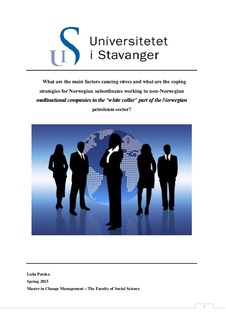| dc.contributor.author | Potoku, Laila | |
| dc.date.accessioned | 2015-09-03T10:42:02Z | |
| dc.date.available | 2015-09-03T10:42:02Z | |
| dc.date.issued | 2015-06-15 | |
| dc.identifier.uri | http://hdl.handle.net/11250/298593 | |
| dc.description | Master's thesis in Change management | nb_NO |
| dc.description.abstract | Stress in the workplace represents a challenge and a cost for the individual, the companies and the society as a whole, and is high on the agenda in many countries, also in Norway. Norwegian society and working life have become increasingly multicultural and multinational, and the petroleum sector is no exception. The aim of the study was to get a deeper understanding of the factors that typically trigger stress working in the white collar part of the petroleum sector. The research question for this study is as follows:
What are the main factors causing stress and what are the coping strategies for Norwegian subordinates working in non-Norwegian MNCs in the “white collar” part of the Norwegian petroleum sector?
A qualitative approach through interviews was selected to address the research question. Six respondents were selected from non-Norwegian multinational companies with headquarters in a country with a large Hofstede’s power distance (a measure of inequality) from Norway. Four sub research questions were formulated in order to answer the research question.
Norwegian subordinates working in, and being part of a multicultural work environment in non-Norwegian MNCs in the Norwegian petroleum sector experience stress from a variety of factors. The main conclusion in relation to stress is that there are factors causing stress within the organizational culture, the organizational structure, the multicultural work environment, and related to the job situation.
In relation to the organizational culture and structure, both the dominant culture and the hierarchical structure in the MNCs were mentioned as factors causing stress among the respondents. The multicultural work environment was also a cause of stress, and both the culture differences and the use of English as a common language were mentioned. In relation to the job situation, three main factors were mentioned: the unpredictability in demand, lack of support from the supervisor and the supervisor’s lack of knowledge. Lack of control was a factor causing stress only to a minority of the respondents.
None of the respondents mentioned any stress due for instance fear of unemployment caused by the current situation in the petroleum sector.
All the respondents were using coping strategies within two or more coping strategy dimensions, but the coping strategies within the problem-focus dimension were most common. | nb_NO |
| dc.language.iso | nob | nb_NO |
| dc.publisher | University of Stavanger, Norway | nb_NO |
| dc.relation.ispartofseries | Masteroppgave/UIS-SV-IMKS/2015; | |
| dc.subject | coping strategies | nb_NO |
| dc.subject | stress factors | nb_NO |
| dc.subject | multinational companies | nb_NO |
| dc.subject | change management | nb_NO |
| dc.subject | stress | nb_NO |
| dc.subject | endringsledelse | nb_NO |
| dc.subject | Norwegian petroleum sector | nb_NO |
| dc.subject | petroleumsindustrien | nb_NO |
| dc.title | What are the main factors causing stress and what are the coping strategies for Norwegian subordinates working in non-Norwegian MNCs in the “white collar” part of the Norwegian petroleum sector? | nb_NO |
| dc.type | Master thesis | nb_NO |
| dc.subject.nsi | VDP::Social science: 200::Economics: 210::Business: 213 | nb_NO |
